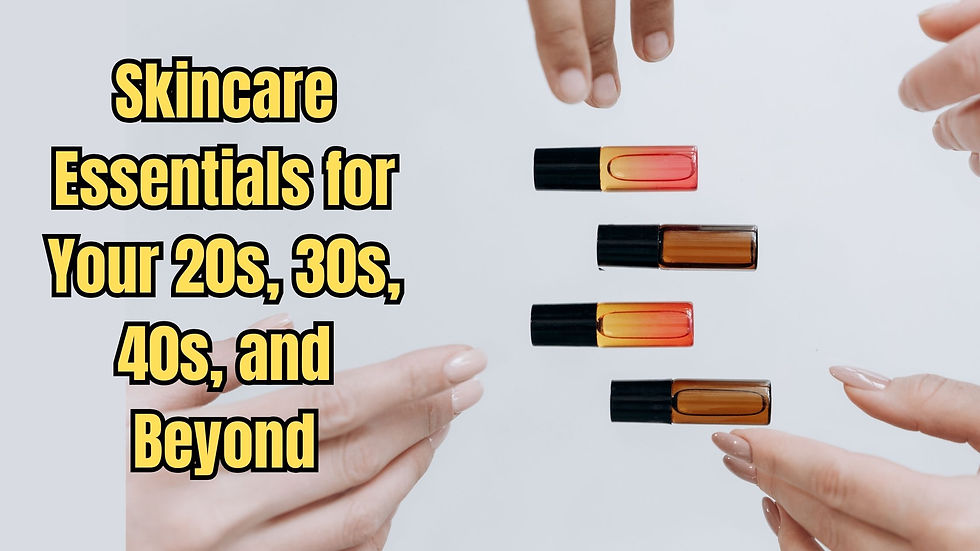How to Choose the Right Face Mask for Your Skin Type
- Akram Beauty Booth
- Dec 17, 2024
- 4 min read
Face masks are one of the best skincare treatments you can give your skin. Whether you're looking for a quick fix for a dull complexion or seeking to target specific skin concerns, the right face mask can do wonders for your skin. However, with so many options available in the market, it can be overwhelming to figure out which one suits your skin type. Choosing the wrong mask can lead to irritation or ineffective results. In this post, we’ll walk you through how to choose the perfect face mask based on your skin type.

Understanding Your Skin Type
Before selecting a face mask, it’s essential to determine your skin type. Your skin type can be categorized as oily, dry, combination, sensitive, or normal. Identifying your skin type will help you select a mask that addresses your specific needs.
Oily Skin: If your skin feels greasy, especially around the T-zone (forehead, nose, chin), you likely have oily skin.
Dry Skin: Dry skin tends to feel tight, flaky, and rough, especially after cleansing.
Combination Skin: Combination skin involves having an oily T-zone and dry or normal cheeks.
Sensitive Skin: Sensitive skin is easily irritated, and prone to redness, burning, and breakouts.
Normal Skin: Normal skin is well-balanced—neither too oily nor too dry, with few imperfections.
How to Choose the Right Face Mask for Your Skin Type
1. Face Masks for Oily Skin
Oily skin can feel greasy and is more prone to breakouts due to excess sebum production. To control oil and prevent acne, you need a face mask that will absorb excess oil, exfoliate dead skin cells, and tighten pores.
Look for: Clay masks, Charcoal masks, or Gel masks.
Clay masks are ideal for oily skin because they absorb excess oil and help prevent clogged pores. Ingredients like bentonite or kaolin clay are excellent at drawing out impurities and balancing oil production.
Charcoal masks work similarly to clay but are even better at detoxifying the skin, absorbing toxins and bacteria from deep within the pores.
Gel masks offer hydration without clogging pores, and they are often lighter than cream-based masks.
Top ingredients to look for: Bentonite clay, charcoal, salicylic acid, tea tree oil.
2. Face Masks for Dry Skin
Dry skin often feels tight, flaky, and lacks moisture. The best face masks for dry skin should hydrate, nourish, and restore moisture to help your skin feel soft and plump.
Look for: Cream-based masks, Hydrating masks, and Sheet masks.
Cream-based masks are thick and hydrating, designed to replenish moisture. They often contain rich ingredients like shea butter, avocado, and hyaluronic acid, which help seal moisture into the skin.
Hydrating masks are specially formulated to deliver intense moisture to dry skin, leaving it looking refreshed and smooth.
Sheet masks are soaked in serums and are often infused with nourishing ingredients that target dryness and help lock in moisture.
Top ingredients to look for: Hyaluronic acid, glycerin, aloe vera, shea butter, and ceramides.
3. Face Masks for Combination Skin
Combination skin can be tricky because different areas of your face have different needs. To balance your skin, you’ll need a mask that can target both oily and dry zones without exacerbating either condition.
Look for: Multi-masking, Clay masks with added hydration.
Multi-masking involves using different masks on different areas of your face (for example, applying a clay mask to the T-zone and a hydrating mask to the cheeks).
Clay masks with hydration provide the benefits of oil control while adding moisture to dry areas of your face. Opt for a dual-action mask that offers both mattifying and moisturizing effects.
Top ingredients to look for: Charcoal, aloe vera, kaolin clay, vitamin C.
4. Face Masks for Sensitive Skin
Sensitive skin can react easily to harsh ingredients, causing redness, irritation, and discomfort. The goal is to find a mask that soothes, calms, and repairs your skin’s natural barrier.
Look for: Calming, Soothing, and Hypoallergenic masks.
Soothing masks are formulated with ingredients that reduce redness and inflammation. Look for calming ingredients like chamomile, calendula, oatmeal, or cucumber.
Hydrating masks also work well for sensitive skin, as they help restore moisture and balance the skin’s barrier.
Hypoallergenic masks are designed for sensitive skin, with gentle ingredients and fewer irritants.
Top ingredients to look for: Chamomile, aloe vera, calendula, oats, honey, and cucumber.
5. Face Masks for Normal Skin
Normal skin typically doesn’t have major issues, but a mask can provide an added glow or a deep cleanse when needed. Look for masks that provide additional benefits like hydration or brightening.
Look for: Brightening masks, Exfoliating masks, and Hydrating masks.
Brightening masks can help even out your skin tone, providing a radiant glow. Ingredients like vitamin C, niacinamide, or alpha hydroxy acids (AHAs) help to brighten and rejuvenate the skin.
Exfoliating masks with gentle exfoliants can help remove dead skin cells, leaving your skin feeling smooth and refreshed.
Hydrating masks provide extra moisture, keeping your skin soft and healthy.
Top ingredients to look for: Vitamin C, glycolic acid, niacinamide, and papaya enzymes.
Final Tips for Choosing the Right Face Mask
Patch Test: Always patch-test a new mask on a small area of your skin before using it on your face. This will help you avoid potential allergic reactions.
Ingredients Matter: Pay attention to the ingredients list, as some masks may contain harsh chemicals or fragrances that can irritate your skin.
Follow Instructions: Always follow the instructions for each face mask. Leaving a mask on too long can irritate your skin, while not leaving it on long enough can reduce its effectiveness.
Consistency is Key: For best results, use a face mask 1-2 times per week, depending on your skin’s needs.
Conclusion
Choosing the right face mask for your skin type is essential to ensure you get the most out of your skincare routine. Whether you have oily, dry, combination, sensitive, or normal skin, there’s a mask that can address your concerns and give you glowing healthy skin. By understanding your skin type and selecting the right mask, you’ll be well on your way to achieving the perfect complexion.





Comments